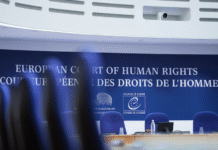The European Court of Human Rights (ECtHR) has notified Turkey of an additional 4,800 applications in its docket related to convictions for Gülen movement membership over the use of the ByLock messaging app, in the largest mass notification in the court’s history, the Bold Medya news website reported on Monday.
Turkish authorities have considered ByLock, once available in Apple’s App Store and Google Play, to be a secret tool of communication among supporters of the Gülen movement since a coup attempt on July 15, 2016, despite a lack of evidence that ByLock messages were related to the abortive putsch.
With this recent notification, the total number of ByLock-related cases communicated by the court to the Turkish government in line with its “pilot judgement procedure” following its ruling in Yüksel Yalçınkaya v. Turkey has reached 10,800.
In a pilot judgment in September 2023, the Grand Chamber of the ECtHR ruled that Turkey had violated three articles of the European Convention on Human Rights (ECHR) in the case of former teacher Yüksel Yalçınkaya, who, among other things, was convicted of terrorism in Turkey due to his use of ByLock. The court said Turkey had violated Article 6 (right to a fair trial), Article 7 (no punishment without law) and Article 11 (freedom of assembly and association).
The “pilot judgment” procedure allows the court to address systematic rights violations without re-examining thousands of identical cases. After a ruling, the court forwards similar cases to the government concerned urging broader remedies.
Legal experts stressed that the Grand Chamber’s decision made clear ByLock use cannot be treated as evidence of criminal activity.
Human rights lawyer and advocate Kadir Öztürk stated on X that the move shows that the ECtHR continues to apply the standards it set in the Yalçınkayaruling, particularly regarding the principles of personal criminal responsibility, legality under Article 7 of the ECHR and the right to a fair trial under Article 6.
Öztürk noted that the unprecedented notification of 4,800 applications in a single wave highlights the court’s determination to resolve the structural issues stemming from convictions based solely or primarily on ByLock data, which the court considers insufficient and unreliable as evidence.
He added that around half of the complaints regarding ByLock-related convictions are still under review and are expected to be gradually notified over the next year.
The ECtHR ruled also on July 22 that Turkey violated the rights of 239 people convicted of terrorism offenses due to their alleged ties to the faith-based Gülen movement, finding that the Turkish judiciary failed to ensure fair trials and imposed criminal penalties without a clear legal basis.
Turkish President Recep Tayyip Erdoğan has been targeting followers of the Gülen movement, inspired by the late Muslim cleric Fethullah Gülen, since corruption investigations in December 2013 implicated him as well as some members of his family and inner circle.
Dismissing the investigations as a Gülenist coup and a conspiracy against his government, Erdoğan began to target the movement’s members. He designated the movement as a terrorist organization in May 2016 and intensified the crackdown on it following the abortive putsch in July of the same year that he accused Gülen of masterminding. The movement strongly denies involvement in the coup attempt or any terrorist activity.
According to the latest figures from the Justice Ministry, more than 126,000 people have been convicted for alleged links to the Gülen movement since 2016, with 11,085 still in prison. Legal proceedings are ongoing for over 24,000 individuals, while another 58,000 remain under investigation nearly a decade later.
In addition to the thousands who were jailed, scores of other Gülen movement followers had to flee Turkey to avoid the government crackdown.















